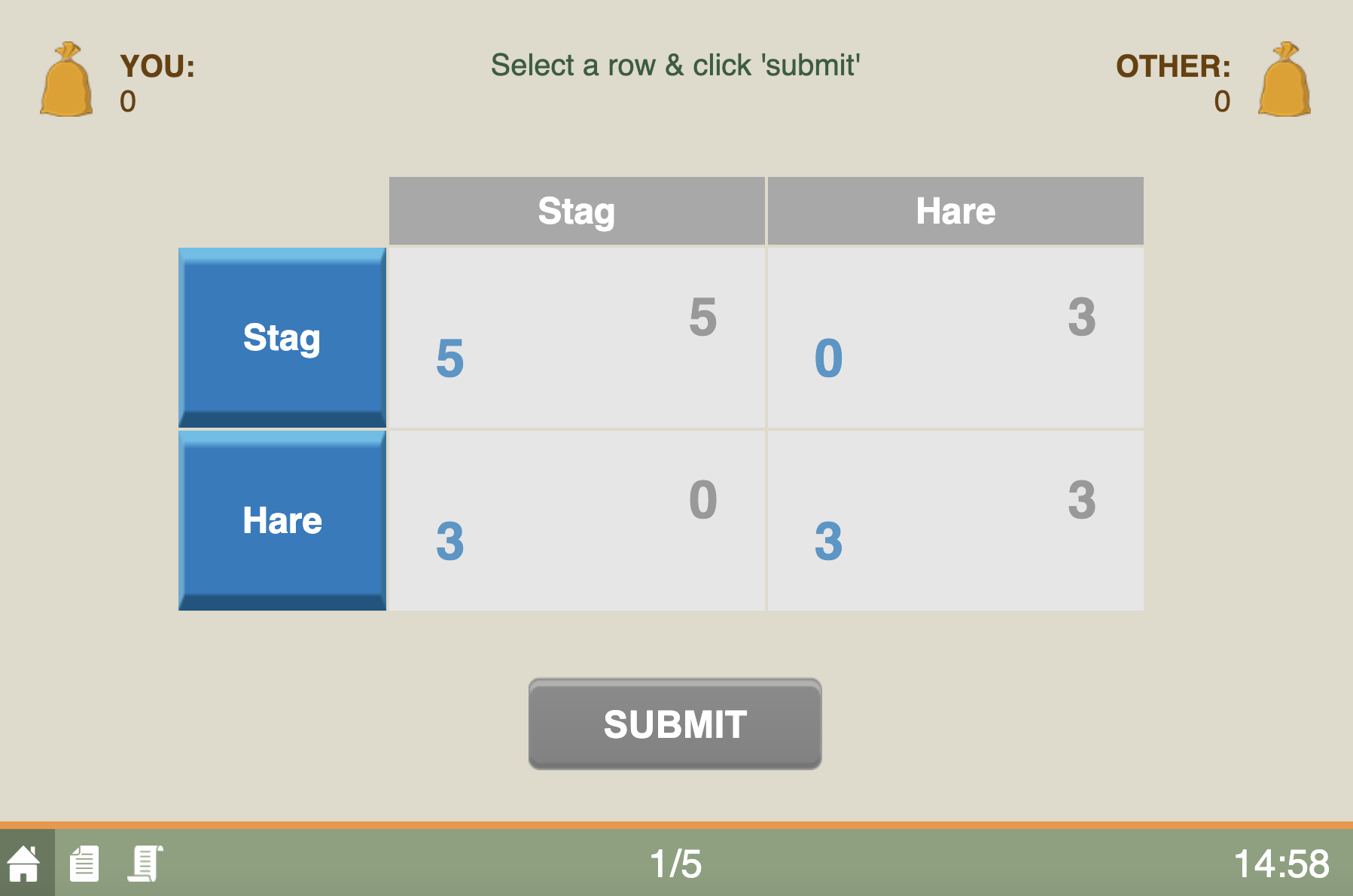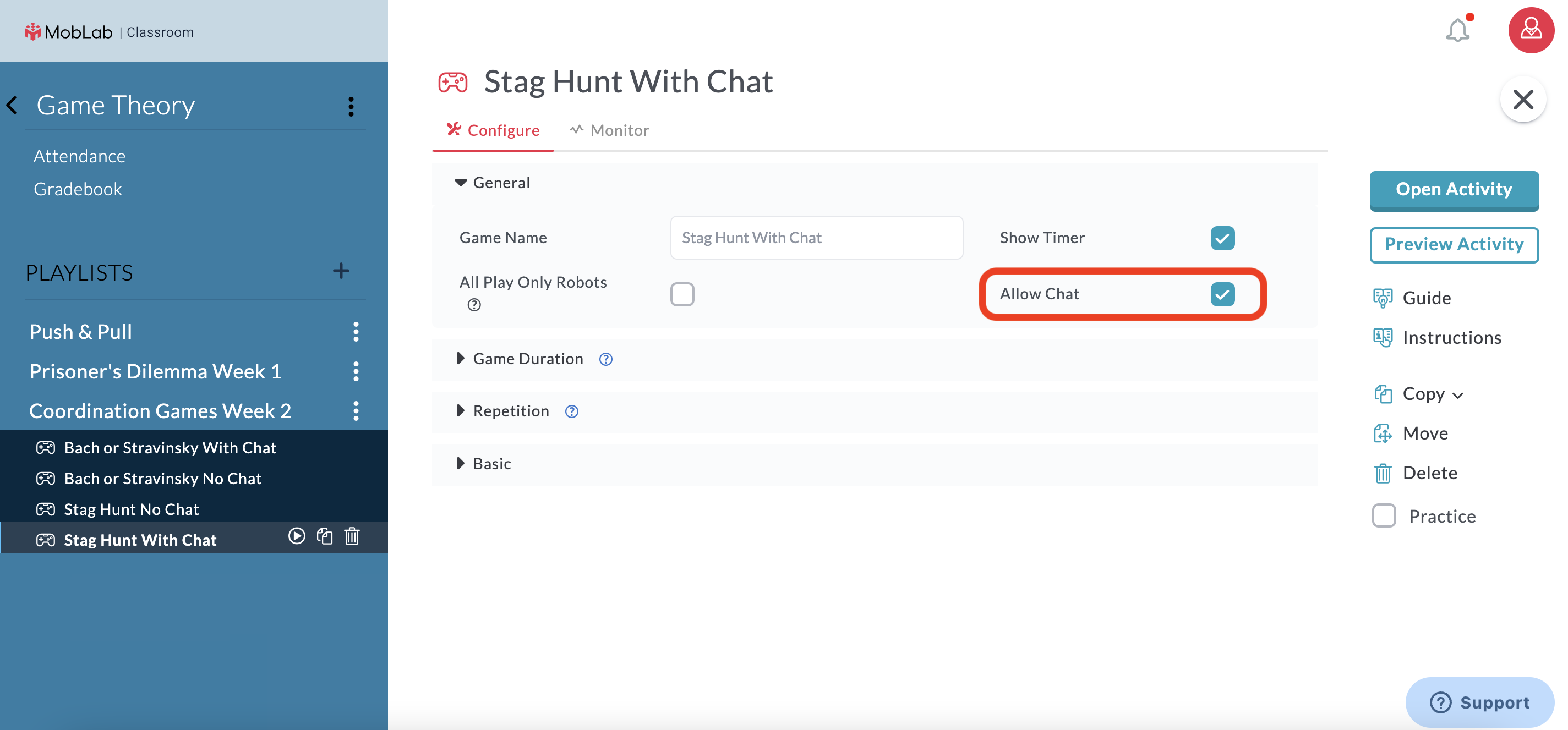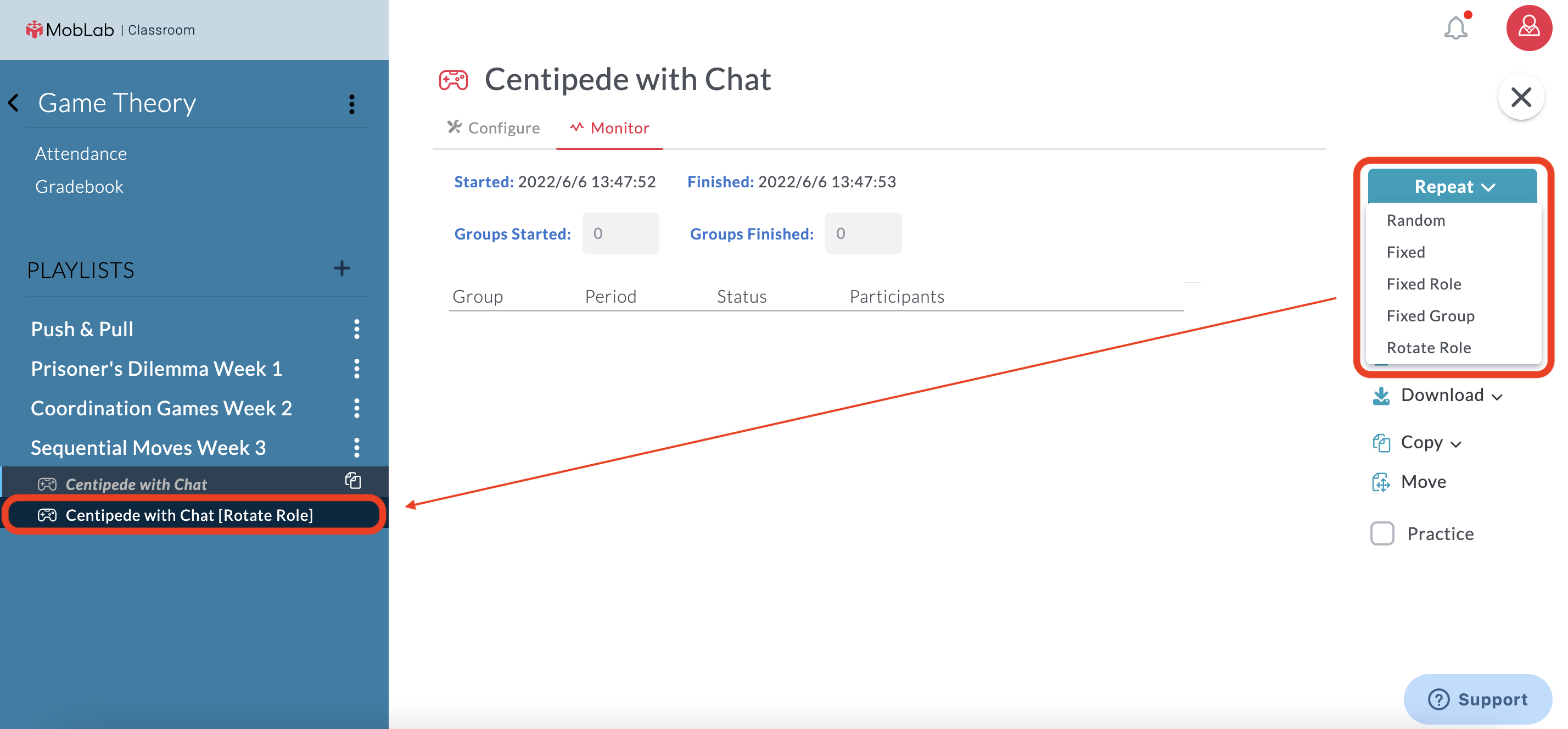In this two-part series, we are taking a deeper look into 4 best practices that instructors have repeatedly used to get the most out of their MobLab experience in Game Theory courses. In our previous post, we examined the Push & Pull version of the Prisoner’s Dilemma and how to take students through a full game theory learning loop using both static one-shot games and dynamic, multiple round playlists to introduce students to a variety of strategic interactions.
In this post, we will cover two other ways of increasing student engagement and understanding:
Enabling the Chat Function
Replay Options Enabling the Chat Function to Encourage Cooperation in Game Theory Courses
Cooperation is a key strategy in Game Theory, and with MobLab, instructors can set up games that give students the option to cooperate with each other by enabling chat. This allows students to coordinate with their partner(s) to achieve higher payoffs. Let’s take another Game Theory activity, Stag Hunt, as an example:

Student Screen of the Stag Hunt Game
In this classic game of coordination, each of two players must simultaneously choose between a sure thing and an action with a higher payoff only if chosen by both. Both communication and repeat interaction will increase coordination. Enabling the chat function in this game and a variety of other MobLab games can show how coordination (or collusion) affects experimental results. The below screenshot shows how to enable chat when available:

Allow Chat via the Instructor Configuration Page
Our chat function can be enabled for all of our Game Theory games, even those games where cooperation is not always the best outcome. Adding in this feature may alter student behavior and allow for a robust discussion to begin about coordination and other best strategies for game theory games.
Replaying Games for Different Student Roles/Groups
MobLab games can bring so much fun to a lecture that you want to play them over and over again! After finishing your first game, the right-most button changes from Run Game to Repeat. Instructors have found value in replaying games since it gives students an opportunity to play again in a new role or group. For certain Game Theory games, you may want your students to be able to get as full of a picture of the concept as possible. This is best achieved by repeating a game and letting students play in a new role or new group.
Clicking the Repeat dropdown reveals a list of replay options as seen in the example below. A game can be replayed with the following options: Random, Fixed, Fixed Role, Fixed Group, or Rotate Role. To learn more about the matching options, review our article on Matching. By selecting one of the matching options, a new, identical game will be created to the same playlist. In the below screenshot, we have replayed MobLab’s version of the Centipede Game with rotating roles.

Repeat Game Options
As we have been building out these activities within playlists, we have kept things organized by separating our experiments by topic and inserting new names. Students logging into the MobLab student console or mobile app will see the name of the playlist when they join an active session, but not the name of the individual activities. Naming your activities ensures you know which activity is coming next and allows you to easily refer to past experimental results. This can be very useful in Game Theory courses because comparing results from different variations can reveal interesting trends in student behavior.
n this two-part series, we have demonstrated some best practices for using MobLab experiments in a Game Theory course – from choosing an introductory prisoner’s dilemma game to varying replay configurations – bringing a unique experience of Game Theory to each class.
Bonus Tip: Do not be afraid to ask reflection questions after an experiment using the Blank Survey tool!
Want to learn more about our online economics games? Get in touch and we would be happy to give you a personalized tour of the MobLab economics games platform.
In this post, we will cover two other ways of increasing student engagement and understanding:
Cooperation is a key strategy in Game Theory, and with MobLab, instructors can set up games that give students the option to cooperate with each other by enabling chat. This allows students to coordinate with their partner(s) to achieve higher payoffs. Let’s take another Game Theory activity, Stag Hunt, as an example:

Student Screen of the Stag Hunt Game

Allow Chat via the Instructor Configuration Page
Replaying Games for Different Student Roles/Groups
MobLab games can bring so much fun to a lecture that you want to play them over and over again! After finishing your first game, the right-most button changes from Run Game to Repeat. Instructors have found value in replaying games since it gives students an opportunity to play again in a new role or group. For certain Game Theory games, you may want your students to be able to get as full of a picture of the concept as possible. This is best achieved by repeating a game and letting students play in a new role or new group.
Clicking the Repeat dropdown reveals a list of replay options as seen in the example below. A game can be replayed with the following options: Random, Fixed, Fixed Role, Fixed Group, or Rotate Role. To learn more about the matching options, review our article on Matching. By selecting one of the matching options, a new, identical game will be created to the same playlist. In the below screenshot, we have replayed MobLab’s version of the Centipede Game with rotating roles.

Repeat Game Options
n this two-part series, we have demonstrated some best practices for using MobLab experiments in a Game Theory course – from choosing an introductory prisoner’s dilemma game to varying replay configurations – bringing a unique experience of Game Theory to each class.
Bonus Tip: Do not be afraid to ask reflection questions after an experiment using the Blank Survey tool!
Want to learn more about our online economics games? Get in touch and we would be happy to give you a personalized tour of the MobLab economics games platform.

